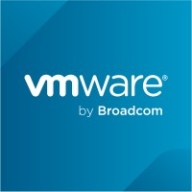

DigitalOcean and VMware Cloud Foundation excel in the competitive cloud computing market with unique strengths. DigitalOcean holds an advantage for cost-conscious firms with simpler needs, while VMware Cloud Foundation provides robust features for enterprises.
Features: DigitalOcean offers easy-to-use scalable compute instances, object storage, and integrated security. It targets developers needing quick deployment. VMware Cloud Foundation features an extensive hybrid cloud platform, including advanced networking, storage, and automation tools suited for large enterprise operations.
Room for Improvement: DigitalOcean could enhance networking flexibility and expand its geographical presence. Its documentation might also benefit from more comprehensive examples. VMware Cloud Foundation could simplify its intricate deployment process and improve integration with third-party tools. Additionally, streamlining customer interface aspects can make it more user-friendly.
Ease of Deployment and Customer Service: DigitalOcean's deployment is simple, offering quick setup ideal for independent developers or smaller companies. Its customer service is accessible and supportive. VMware Cloud Foundation, however, caters to enterprise-level support, with its detailed deployment process allowing extensive customization for large operations.
Pricing and ROI: DigitalOcean is attractive for small to medium-sized businesses due to its predictable and affordable pricing, optimizing ROI. Its low setup costs are suitable for startups. VMware Cloud Foundation has higher initial costs but offers significant ROI for companies needing comprehensive infrastructure scalability and extensive capabilities.
VMware Cloud Foundation allows cost and time savings by quickly deploying infrastructure requests and integrating automatic ticketing and backup services.
In terms of ROI, although VMware Cloud Foundation is expensive, it saves time in most cases, which indirectly saves costs for users.
DigitalOcean support is rated lower than AWS's because we encounter issues more frequently.
There are times when support is unclear, and even VMware support personnel may lack familiarity with certain parts, causing difficulties.
Based on my nine years of experience with VMware, I would evaluate their technical support as effective.
The technical support from VMware Cloud Foundation deserves a nine out of ten rating.
I have not tried vertical scaling yet, but from the documentation, it seems very easy to scale the system.
When more hosts are added, performance goes slow.
VMware Cloud Foundation supports scalability and company growth.
VMware Cloud Foundation is quite scalable, receiving a rating of eight and a half to nine out of ten.
DigitalOcean is quite stable, and I would rate its stability at nine out of ten.
It is approximately 50 to 60% stable, reaching 60 to 70% depending on usage levels.
The stability of VMware Cloud Foundation is very high.
If one component fails to operate in a timely manner, the entire infrastructure can go down because everything is interconnected.
I am currently satisfied with the stability of VMware Cloud Foundation, though having started only two to three months ago, I am still in the monitoring phase.
DigitalOcean could offer a pay-as-you-go model similar to AWS, where I would pay for what I use rather than having fixed payments.
There are issues where even with 8 GB RAM, the performance doesn't meet expectations.
The lack of a proper service provider model ultimately led us to cease operations with DigitalOcean.
VMware Broadcom needs to include auto resource allocation at the VM levels.
The maintenance cost has increased significantly, especially after Broadcom acquired VMware, with a shift from socket-based licensing to core-based licensing.
Each user needs deep knowledge of every aspect of virtualization.
DigitalOcean offers affordable pricing, especially for startups.
The cost has become very high, especially after Broadcom's acquisition, altering the licensing model to a more expensive core-based system.
When comparing prices of both clouds, AWS is cheaper because they offer a free section for practice.
The price is quite higher than some other vendors.
The droplet feature is valuable for hosting my applications as it is particularly cost-effective and serves my needs well.
The most significant aspect is that we can connect directly to the system from anywhere.
The team was particularly satisfied with the flexibility of the service and the rules for managing virtual machines on DigitalOcean.
The solution now offers auto-deployment of VMs.
All features of VMware Cloud Foundation are valuable to us, as it covers every industry standard protocol and requirement protocol.
VMware Cloud Foundation allows for extensive customization, aligning with our customer requirements.
| Product | Market Share (%) |
|---|---|
| VMware Cloud Foundation | 1.6% |
| DigitalOcean | 2.0% |
| Other | 96.4% |


| Company Size | Count |
|---|---|
| Small Business | 10 |
| Midsize Enterprise | 2 |
| Large Enterprise | 2 |
| Company Size | Count |
|---|---|
| Small Business | 8 |
| Midsize Enterprise | 3 |
| Large Enterprise | 27 |
VMware Cloud Foundation makes it easy to deploy and run a hybrid cloud. VMware Cloud Foundation provides integrated cloud infrastructure (compute, storage, networking, and security) and cloud management services to run enterprise applications in both private and public environments.
We monitor all Infrastructure as a Service Clouds (IaaS) reviews to prevent fraudulent reviews and keep review quality high. We do not post reviews by company employees or direct competitors. We validate each review for authenticity via cross-reference with LinkedIn, and personal follow-up with the reviewer when necessary.